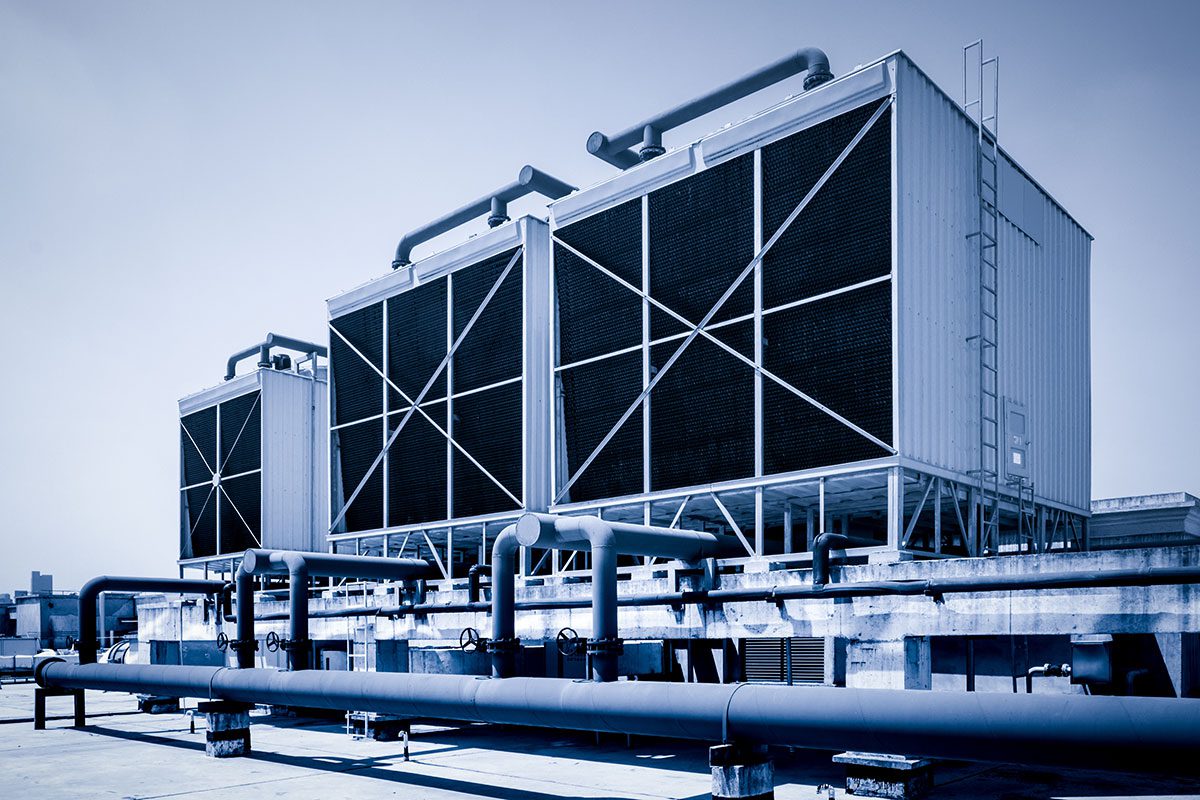The Role of Chillers in Commercial HVAC Systems
Chillers are crucial in modern HVAC systems, yet their importance often goes unnoticed. This guide will explain how they work and what their impact is on HVAC efficiency.
What Is a Chiller and How Does It Work?
Smaller buildings or residential properties often rely on straightforward cooling technologies such as split systems or heat pumps, which can effectively manage their cooling needs.
However, larger commercial buildings have more complex cooling requirements. They often house a lot of heat-generating equipment, have large numbers of people moving in and out, and have extensive areas to cool. A simple air conditioning unit is insufficient in these cases.
This is where Chillers come in. Chillers are sophisticated devices that lower the temperature of water running through the HVAC system. A typical chiller uses a refrigerant to absorb heat from the water through a process called vapor-compression.
We don’t want to get too technical, so here is a very basic description of this process:
First, the refrigerant takes heat from the water. Then it is turned into hot compressed gas. As the gas cools, it turns back into a liquid. At the final step, its pressure is reduced to start the cycle over.
Types of Chillers
Air-cooled and water-cooled are the two main types of chillers.
Air-Cooled Chillers
These chillers use fans that blow air over the condenser to cool the refrigerant. They are less energy-efficient than water-cooled chillers. On the other hand, air-cooled chillers are easier to install and do not require water access to operate.
Air-cooled chillers can be found in small office buildings, educational institutions, or factories with lower cooling demands.
Water-Cooled Chillers
These chillers cool the refrigerant with water from a cooling tower. It means adding more components into the system, including pumps and the tower itself, and requires access to a water source. However, water-cooled chillers offer a massive benefit by lowering the long-term operational costs due to better efficiency.
Water-cooled chillers are frequently employed in large commercial buildings, industrial applications, and other settings with significant cooling needs. Examples include data centers, hospitals, and large manufacturing facilities.
The Benefits of Chillers
Beyond providing essential cooling, chillers significantly reduce energy consumption. Modern models utilize cutting-edge technologies like variable-speed drives and energy-efficient compressors. These enhancements help cut down on energy use and expand the chiller’s lifespan by reducing wear and tear.
By efficiently controlling the cooling process, chillers help maintain optimal humidity levels. This is vital for the prevention of issues like mold and mildew growth, which can compromise the structural integrity of your building and the health of its occupants. A well-maintained chiller improves air quality, furthering the comfort and health of your indoor environment.
Another important advantage of chillers is their scalability. They can match the specific needs of a building, whether it’s a small commercial establishment or a large industrial complex. This scalability makes chillers a versatile solution, able to meet a wide range of cooling requirements.
Does Your HVAC System Need a Chiller?
Determining whether your building requires a chiller and what type comes down to your specific cooling needs and energy efficiency goals.
Smaller spaces or businesses with budget constraints might lean towards an air-cooled chiller. These systems, being standalone and easier to install, can fulfill their cooling requirements while keeping initial costs low.
A water-cooled chiller might be a better option for larger buildings with substantial cooling needs. These chillers are typically more energy-efficient and handle greater cooling loads.
Despite a higher upfront cost, they provide a cost-effective solution in the long term, especially when energy costs are a significant consideration.
However, to achieve maximum efficiency, regular chiller maintenance is essential. It should include routine inspections, system pressure and temperature checks, cleaning the condenser and evaporator tubes, and leak testing. Proper chiller maintenance ensures optimal performance and extends the unit’s lifespan.
Chillers are a cornerstone of today’s advanced HVAC systems. If you want to learn more about them or would like to get one installed, our experts will gladly help. Call us, and let’s talk!


